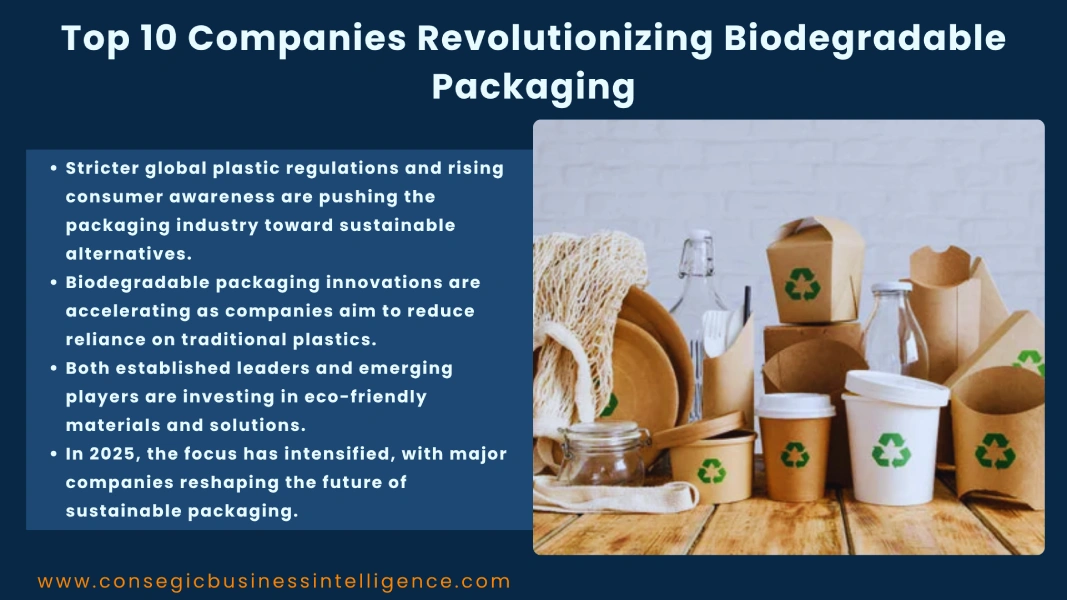Top 10 Companies Revolutionizing Biodegradable Packaging
The growing stringent regulations on plastic and the rise in consumer awareness about the environmental sustainability is driving the biodegradable packaging market to boost the innovations and expansion. A wide range of companies, starting from the well-established packaging companies to the emerging companies, are focusing on developing and providing packaging solutions that minimizes the reliance on plastic and reduces the ecological footprint. In 2025, major companies are focusing on revolutionizing biodegradable packaging because of the growing demand for environmentally friendly and sustainable packaging solutions. This article explores the top companies that are transforming biodegradable packaging.

1.Amcor
Amcor is one of the largest packaging companies which has made a significant commitment to sustainability. The company was founded in 1896, and it believes in circular packaging. It aims to make all its packaging material recyclable, reusable or compostable. They are active in the development of high-performance films, paper-based solutions, and bioplastics. The company provides a wide range of packaging solutions that cater to applications such as beverages, food, healthcare, and others. The company’s production scale and their global reach has a significant impact on enhancing the sustainable packaging industry. The headquarters of the company is present in Switzerland.
2. Mondi
Mondi is one of the global integrated packaging and paper groups, founded in 1967, that mainly work under three business groups. They include corrugated packaging, flexible packaging, and uncoated fine paper. The strategy of the company focuses on providing value-accretive growth and sustainability. The company provides a range of Sustainex packaging, which is an innovative range of extrusion coated packaging material that consists of biodegradable properties. The company’s commitment to developing packaging is mainly sustainable by design, which positions them as one of the key players in revolutionizing biodegradable packaging. The headquarters of the company is present in the United Kingdom.
3. Tetra Pak
Tetra Pak is one of the companies of carton packaging for beverages and liquid food. The company has been in the lead of sustainability for various years. The company is focusing on increasing their use of plant-based polymer, mainly that which is derived from sugarcane. They focus on the use of sugarcane-based bioplastics in their carton layers and developing advanced biodegradable coatings to enhance the composability of their already highly recyclable products. The company was founded in 1951, and the headquarters of the company is present in Sweden.
4. Ecovative Design
Ecovative is one of the major companies that is mainly known because of its mycelium-based packaging. The company used the root structure of mushrooms that is grown on agricultural byproducts. The company mainly focuses on creating packaging that is completely compostable at home and provides novel protective qualities as a major alternative to polystyrene foam. Their MycoComposite material is gaining popularity across several industries that are mainly focusing on sustainable packaging solutions. The company was founded in 2007, and the headquarters of the company are present in the United States.
5. Notpla
Notpla which is founded in 2014, with its headquarters present in London is a sustainable packaging startup that generally focuses on seaweed and plant-based packaging. Their flagship product, Ooho, is an edible, biodegradable sachet that is mainly designed to encapsulate liquids such as beverages and sauces. The materials for these packaging’s are derived from brown seaweed, that generally grows rapidly, requires no fresh water or fertilizer. This packaging provides a highly sustainable alternative to single-use plastics, with applications expanding into films and paper coatings.
6. BIOFASE
BIOFASE is a Mexican packaging company that transforms the agricultural waste mainly the avocado pits into a range of biodegradable products that consists of containers, films, and others. The material mainly provides a circular economy solution that degrades completely. This shows potential for biowaste valorization in packaging.
7. Sulapac
Sulapac is transforming luxury and premium packaging with its wood-based biodegradable materials. The combination of wood chips with natural binders provides microplastic-free solutions that provide similar water, oil, and oxygen resistance to conventional plastics. They’re aesthetically pleasing, and functionally novel materials are ideal for applications such as cosmetics, personal care, and other high-end products that are moving towards sustainable solutions. The company was founded in 2016, and the headquarters are present in Finland.
8.TIPA Corp Ltd
TIPA is a company that mainly focuses on the development and manufacturing of certified compostable flexible films that degrade in industrial or home composting environments. These films are mainly used for a wide range of products that generally include fresh produce and dry food among others. The company was founded in 2010, and the headquarters of the company are present in Isreal.
9. Elevate Packaging
Elevate Packaging company which is a U.S. based company founded in 2000, stands out because of its wide selection of certified compostable packaging solutions, that mainly cater to natural foods and e-commerce sectors. They provide a significant range of products, including bags, labels, and films, and mainly utilize PLA-based materials. The company is committed to making sustainable packaging accessible and effective for businesses looking for sustainable solutions.
10. Ranpak
Runpak is one of the global leaders in providing environmentally sustainable, paper-based protective packaging solutions for the e-commerce and industrial supply chain sectors. Established in 1972, the company's core mission lies in replacing traditional plastic-based packaging materials with innovative, paper-based alternatives that are renewable, biodegradable, and curbside recyclable.
Conclusion
These companies, alongside many other emerging players, are collectively addressing the urgent need for sustainable alternatives to traditional plastic packaging. Their wide approaches, from advanced bioplastics to innovative material sourcing and end-of-life solutions, are supporting circular economy in the biodegradable packaging industry.
